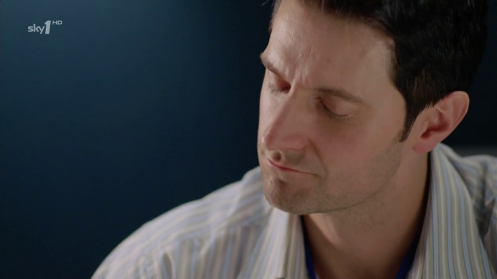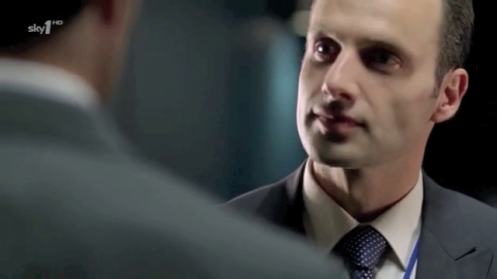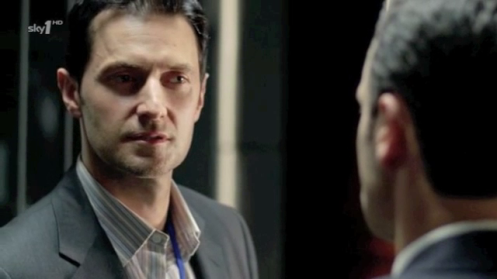Richard Armitage + John Porter status games, or: Waiting makes it better
Okay, yes, Mr. Wagner, I am a Richard Armitage fan and I love how he looks in the buff. Though I’ve actually written about the stripping scene for other reasons. I’ve also written about the expressive way he uses his mouth in fight scenes. And the beauty of his hands in this episode. So, really, it’s not all about the naked Armitage. And frankly, the man’s got some seriously gorgeous moments in Strike Back 1.3 even with all his clothes on.
[All caps in this post are mine.]
Like this:
Or this:

John Porter (Richard Armitage), playing John Dean, examines a blood diamond in Strike Back: Origins 1.3.
Or this:
Or this:

Porter / Dean (Richard Armitage) confronted with Felix Masuku in Chikurubi Prison in Strike Back: Origins 1.3.
Or this:
***
Indeed, we established some time ago that almost any trousers Porter wore — or no trousers — made him beautiful. In the language of the logician, then, it’s sufficient, but not necessary, for Richard Armitage to take his clothes off in order to be beautiful.
But I’m really not writing about Richard Armitage’s physical charms here, overwhelming as they are. The last two weeks, I’ve explored John Porter’s execution of status games with Hugh Collinson, arguing that Armitage subtly turns over the subordinate position status dynamic of his character in Origins 1.1 via his use of physical and gestural language in 1.2.
I debated whether to continue with this theme, or to move on instead to discussion some of Armitage’s scenes with Jodhi May, but decided for various reasons to stick with the Porter / Collinson frenemy relationship, not least because it’s just so well played. So tonight I’ll pick up the next installment of status games between Porter and Collinson, in a discussion of another one of my favorite scenes from this week’s episode. My general approach below will be to look not just at the status game (who’s claiming or renouncing top status in either case — something readers should be sensitized to now), but to consider how the timing of the exchanges facilitates the status moves.
***
***
In Strike Back: Origins 1.3, we open with the problem Porter will be called upon to solve: Felix Masuku’s attempt to assassinate Robert Mugabe and subsequent capture. Collinson (Andrew Lincoln) is called in by his superior to solve the problem, and Collinson, in turn, calls in Porter. A meeting ensues, in which Collinson informs Porter of the situation and Layla (Jodhi May) gives Porter a legend with which to travel to Zimbabwe. The meeting scene would be interesting to discuss as well — if you have access to the series, look at the way that the characters’ eye movements connect them to each other and create a mood for that scene. The editing technique, which causes us to evaluate the credibility of the statements each character makes, suggests that Collinson is overselling the necessity of the mission, something Porter is informed enough to conclude for himself. Layla’s both explicit and tacit agreement with Porter cements the next phase (after their meeting at the regimental monument toward the end of the previous episode) of their cooperative working relationship. Layla is now “on side.” Porter’s demeanor throughout is confident and professional, recalling the crispness of his behavior in the scene that opened the whole series, the briefing on the Bratton extraction. Porter’s in his element, even to the point of the shake-through head movement at the suggestion that he’ll have to end his life if the mission fails. We’ve talked before about how this movement functions as agreement while its subtext is denial.
As the meeting concludes, Layla leaves the conference room, and Collinson signals to Porter that he’d like to have one more word with him.
The fact that Layla does not witness this exchange is what will (it turns out) make the whole plot for this two-parter work (something that annoyed me about the series and which is reproduced here in the flashback as well — that we don’t see every piece of an interaction in real time, but that pieces of it are revealed later). Here, however, Layla’s departure facilitates the conversation above, which deals with the fate of As’ad.
***

Porter (Richard Armitage) acknowledges his awareness that a failed mission will require him to destroy himself, in Strike Back: Origins 1.3.
***
(Note throughout this the way the lighting works — the right side of Porter’s face starts off almost in darkness — and how we react as that side of his face flashes out of darkness into light, when he turns his head.)
The scene begins as Porter moves from the room with dispatch, turning when Collinson calls him back. This calling at the back of someone is an attempt to maintain his attention, and thus assert power — a kind of marionette game in which first one lets go and then one pulls. Note Porter’s response at 0:02, which ends in him planting his left foot at 0:03. This turn + foot plant is something practically every Armitage character until Thorin Oakenshield does; it feels like something Armitage might have learned in his years of dancing. But here it’s not quite so assertive as it often is. Mood: curious. Porter’s expression says, “yes?”
Collinson walks toward Porter to give him the news that “As’ad’s body hasn’t been recovered,” and we can see Collinson looking carefully at Porter to gauge his reaction to this news, information that the camera will remind us of at 0:06. We get about a half a second of Porter’s face as the scene shifts back to a flashback of the end of the Dartmouth rescue, presumably Porter’s last glimpse of As’ad. Significant here, and you have to look at the vid to see it — Porter begins searching Collinson’s face for something — note the very subtle shifting of the eyes at 0:07.
Back to Porter’s face at 0:14, as Porter asks whether As’ad might still be alive, and lifts his head, so slightly as to be nearly imperceptible, before dropping it to ask the question — is this hopefulness? (The left side of Armitage’s face looks more unguarded than the right, somewhat unusually.) In the moments that follow, Porter’s expressions are very interesting, as the general trajectory of the scene lets Porter gain status and Collinson lose it. I think this effect occurs because Collinson’s statement at 0:18 …

“It’s a big desert,” Collinson (Andrew Lincoln) says to Porter (Richard Armitage) in Strike Back: Origins 1.3.
… is a status concession, physically, before Collinson himself lifts his head …
… almost to see if Porter is going to challenge that assertion.
Porter isn’t, but again you see Armitage grasping status from the bottom, as his response at 0:20 becomes gradually more dismissive:
I find this choice on Armitage’s part fairly intriguing because Collinson is Porter’s boss, and because we know more about what Porter knows than Collinson does at this point. Is this an “oh, well” dismissiveness? An “I don’t want to talk about it” dismissiveness? Yet Porter seems to be dismissing Collinson — almost the hypothetical interaction that Armitage once described occurring between Lucas and Porter, with Porter’s hostility to Lucas’ mind games.
In any case, Porter’s turn to leave, asserting strength, finally pulls a concession out of Collinson that makes Collinson even weaker, as at 0:21. Collinson seems to have been waiting for information that he’s now (for whatever reason) provoked to request: “He didn’t … tell you anything?” Listen in particular to Collinson’s resolution and the pitch of his voice here. He’s definitely fishing, and his fishing comes out as low status. I can’t figure out if this Collinson’s actual weakness, or Lincoln overplaying slightly, but in any case, look at the expression that suddenly flashes over Porter’s face as he turns back to Collinson:
We’re back to the status game atmosphere of episode 2, in which Porter’s expression of interest is both open, and intended to get Collinson to say more, and knowing, and thus reflective of the fact that Porter knows what game’s being played. Collinson’s down move awakens that other, previous Porter, and gets him to stand and face Collinson again at 0:31.
“Such as?” Porter says, and suddenly appears to be coiled, threatening, again. The music enters at this point, which obviously enhances our perception that Porter’s dangerous, and Collinson pulls slightly back with his line, “anything that could tell us where he might have gone.” Note — Porter’s right side almost invisible, with an apparently narrowed eye; the glance from his left side, penetrating, evaluative. Armitage really benefits (as in so many roles) from the shadows his face casts.
It’s at this point that the timing becomes crucial, as Armitage waits an imperceptible few beats before answering, his eyes now searching Collinson’s face, which is edited through as not wavering, even as the searching on Porter’s face takes on an ever more scornful vibe, when the left side of Porter’s mouth moves, just barely, at 0:40. The decision to wait makes it seem ever more likely that Porter is going to point out that Collinson’s game is up. Armitage’s pause makes us stop to look more closely at his face, and see that mouth move.
The downward move of the mouth makes Porter’s face look simultaneously, cruel, sour, and knowing — almost as if he’s thinking, “I can’t believe this shit.” And then we see his mouth moving, and we think, “aha, Porter is going to say what he knows, we’re going to see the takedown.” The pause makes it even more intense.
And then … the first time I saw this, I thought — masterful! At 0:41, the next line begins:
As he delivers the line, Porter makes a very quick lateral move of the head — affirming that he doesn’t speak Arabic, but of course equally negating the connotation of the statement — signaling the game he’s playing to toy with Collinson, that he knows nothing is a game, even if he can’t prove it. What’s fascinating about Porter’s expression here is that he actually backs off, into Porter’s “I’m just a soldier, I don’t know what you’re talking about” mood, even as the knowing, superior look on his face indicates that he knows everything. At the very end of 0:41, his mouth’s opened slightly, but he closes it and hardens his jaw, moving it just a tick further out, towards Collinson. Porter knows he’s on top, now. He doesn’t have to show it with more than just that very subtle microexpressive move.
And after a long glance, in which Collinson is left to evaluate the veracity of Porter’s claim, which on one level is true (he doesn’t speak Arabic) and on another is completely false (As’ad did tell him something, via Katie), Porter returns to the scornful mood of 0:21 and ends the conversation by moving away. But it’s a scorn transformed. If, at the beginning of the scene, it’s the “not worth thinking about” scorn of the SAS operative over against his boss, at the end, it’s the scorn of the man who knows the truth, watching the man who’s lying squirm and twist in the web of his own lies.
Note how timing emphasizes the way that Armitage asserts his control in this scene. At some moments, his eyes appear to be seething, and the music, editing, and acting make us think that he’s about to strike. And at just those moments, Armitage makes him (and us wait), pulls him back, extends the tension — and exerts Porter’s growing mastery over Collinson.
















Amazing how you, Serv, can take an old show and make it seem brand new.
LikeLike
For me, it’s not old — that’s probably the key. I continue to see new things in it (part of my attraction to his acting).
LikeLike
and thanks!
LikeLike
This is it
LikeLike
I’m going to ask a ,very likely, stupid question. Does he know he’s doing all this with his face? Or is he simply acting? Perhaps, he would he be as fascinated by the deconstruction of less than a minute of him on film as I always am. Thank Serv, for some reason, this type of post in the middle of media blitz has an absurdly calming effect.
LikeLike
No, he doesn’t (or shouldn’t). In general, actors assemble a personality with a group of feelings and they inhabit that personality and those feelings, so that what we see is their “normal” or “automatic” generation of the state of mind of the person they’re creating. (That said, some parts of acting are certainly planned, particularly the physical movements in a scene, or “blocking.”) One of my ongoing arguments — that Armitage’s work is especially rich in microexpressions — in fact relies on him not planning these things, as microexpressions are unconscious, fleeting reactions to an inner state of mind.
LikeLike
Thanks Serv. This part is just so well done, on both sides. I knew he wasn’t going to tell Collinson anything of course but watching this just heightens the tension. Collinson wants so badly to know how much Porter knows and what he is going to do. Porter is letting him squirm. Then later we will see Porter’s realization about what he hasn’t been told and is he really that surprised? Is he now beginning to realize or wonder if maybe he too isn’t meant to come back from this mission, that he too is too great a liability? The relationship with Layla is going to evolve as well so next week’s episode is going to add another layer to this story and I truly think that this is what makes this SB so much better than the American version. As Serv has pointed out so well there is so much to learn by just watching each character’s facial expressions and how they present their lines and really what is going on underneath it all. There is depth here not just some words you throw out and go on to the next scene.
LikeLike
Even the guy 😉 should understand and notice what you mean, Serv.
LikeLike
[…] mentioned two weeks ago that one of the irritating things about this series is that the viewer, in attempting to assess […]
LikeLike
Richard Armitage + John Porter status games in Strike Back: Origins 1.3, addendum | Me + Richard Armitage said this on November 23, 2013 at 2:40 am |
[…] a British soldier killed his comrades) and Collinson is uncertain that he has. We discussed how Armitage used timing in order to make Collinson squirm (and then I added the point that the flashback scene makes Collinson’s sudden status drop […]
LikeLike
Richard Armitage + John Porter status games in Strike Back: Origins 1.4 & 1.5 | Me + Richard Armitage said this on November 25, 2013 at 3:52 am |